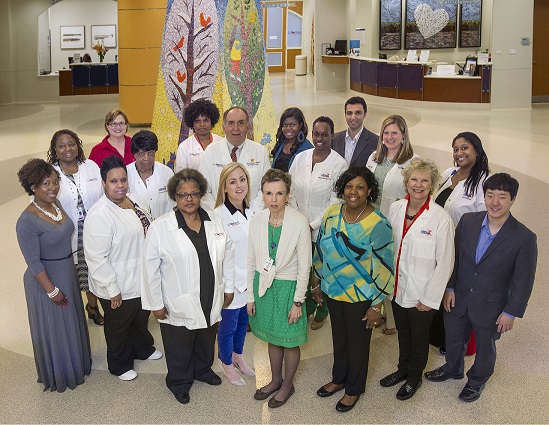The Green & Healthy Homes Initiative
The Green & Healthy Homes Initiative (GHHI) serves low-income families living in Baltimore City, Maryland, using a transformative asthma management model that combines in-home family asthma education; a comprehensive health, safety and home energy audit; and root cause remediation.
Residents of Baltimore City, Maryland, face a higher than average rate of asthma prevalence, hospitalizations, emergency visits and deaths compared with residents of other Maryland regions and the nation as a whole. Approximately 18.6 percent of Baltimore City children have asthma, compared with the national average of only 5 to 8 percent. Furthermore, African Americans living in Baltimore are disproportionately affected. African Americans with asthma visit the emergency room 6.5 times more often than Caucasians. The asthma hospitalization rate for children in Baltimore City is twice the rate of Maryland as a whole, and African Americans in Baltimore experience an asthma mortality rate that is 3 times higher than that of Caucasians.
Working as a coalition of 35 federal, state, local, nonprofit, university and philanthropic partners, GHHI provides health-based housing intervention services to families with asthmatic children ages 2–14 who live in neighborhoods with the highest rates of asthma in the state. Homes in these very low-income communities usually are in deteriorating condition, with such environmental health hazards as high levels of dust, pest antigens, mold and very poor indoor air quality. Following the recommendations of an Environmental Assessment Technician’s report, GHHI deploys professional hazard reduction crews to remediate these home-based environmental hazards to reduce and eliminate avoidable asthmatic episodes.
GHHI began in Baltimore, Maryland, as the Coalition to End Childhood Lead Poisoning. Although originally focused on reducing lead hazards, the organization’s community-based workers perceived that other home-based environmental health hazards—especially asthma triggers—also demanded attention to support children’s health. In 2000, with seed money from the Annie E. Casey Foundation, the Coalition established one of the first Healthy Homes programs in the nation. In 2013, the Coalition changed its name to GHHI to reflect its broadened scope of services and mission impact, with Baltimore as its flagship site.
Since 2000, GHHI Baltimore has conducted housing interventions in 1,118 homes of patients diagnosed with asthma in Baltimore City. By remediating home-based environmental asthma triggers, GHHI has effectively reduced the incidence of asthma among those patients and stopped avoidable visits to the Emergency Department (ED) and hospital. GHHI’s highly successful approach served as the model for Baltimore City’s Office of Green, Healthy and Sustainable Housing. Unlike other Healthy Homes programs, GHHI integrates “green” weatherization and energy efficiency work with traditional healthy homes services, such as integrated pest management and mold removal, to achieve maximum health benefits for the target population. Moreover, GHHI Baltimore builds the community’s human capital. GHHI does this by deploying its own team of contractors to conduct multi-component home interventions and by hiring residents of at-risk Baltimore communities who receive training and accreditation to conduct interventions.
The Maryland Department of Health and Mental Hygiene’s (MDHMH) most recent data showed that, in 2009, 5,514 children in Baltimore City went to the ED for asthma, of whom 792 children who were hospitalized. Data also indicate that 52 percent of children in Baltimore who are hospitalized with asthma are residents of GHHI Baltimore’s target communities. If 52 percent of the city’s 5,514 children with asthma ED visits reside in GHHI’s target communities, GHHI Baltimore reaches approximately 4–7 percent of all children with persistent to severe asthma in those communities. To serve these children, GHHI has an intake stream from established referral sources and long-term partners, including managed care organizations (MCOs) and asthma clinics. GHHI annually serves 100–200 children diagnosed with asthma.
GHHI’s integrated, community-based approach involves all of the necessary partners to provide comprehensive care. With MDHMH funding, GHHI provides training to clinicians and staff of local community clinics and participates in Grand Rounds Trainings for physicians, pediatricians, nurses and other health care providers. GHHI reaches approximately 100 health care providers annually through the Initiative’s instruction on integrating home-based and environmental-focused intervention with comprehensive clinical care. When patients enter the program, an environmental assessment and education team meets with the family to review their home conditions. A GHHI Environmental Asthma Educator serves as the primary point of contact among the family and provider/nurse care manager/case management. The Environmental Asthma Educators staff review the patient’s Asthma Action Plan and medication management. The home asthma educators reinforce the information provided by the clinician and ensure that any behavior that may impact asthma, such as smoking, is addressed.
Besides serving clients directly, in the last 7 years, GHHI has conducted 1,743 outreach presentations and events, including 168 school presentations, 154 daycare center events, 742 community center events and 70 MCO presentations, providing more than 121,912 Baltimore City residents with information about healthy homes and asthma prevention.

Green & Healthy Homes Initiative sites from across the country met in Washington, DC last fall to present a congressional briefing on the health, social and economic benefits of green and healthy housing.

